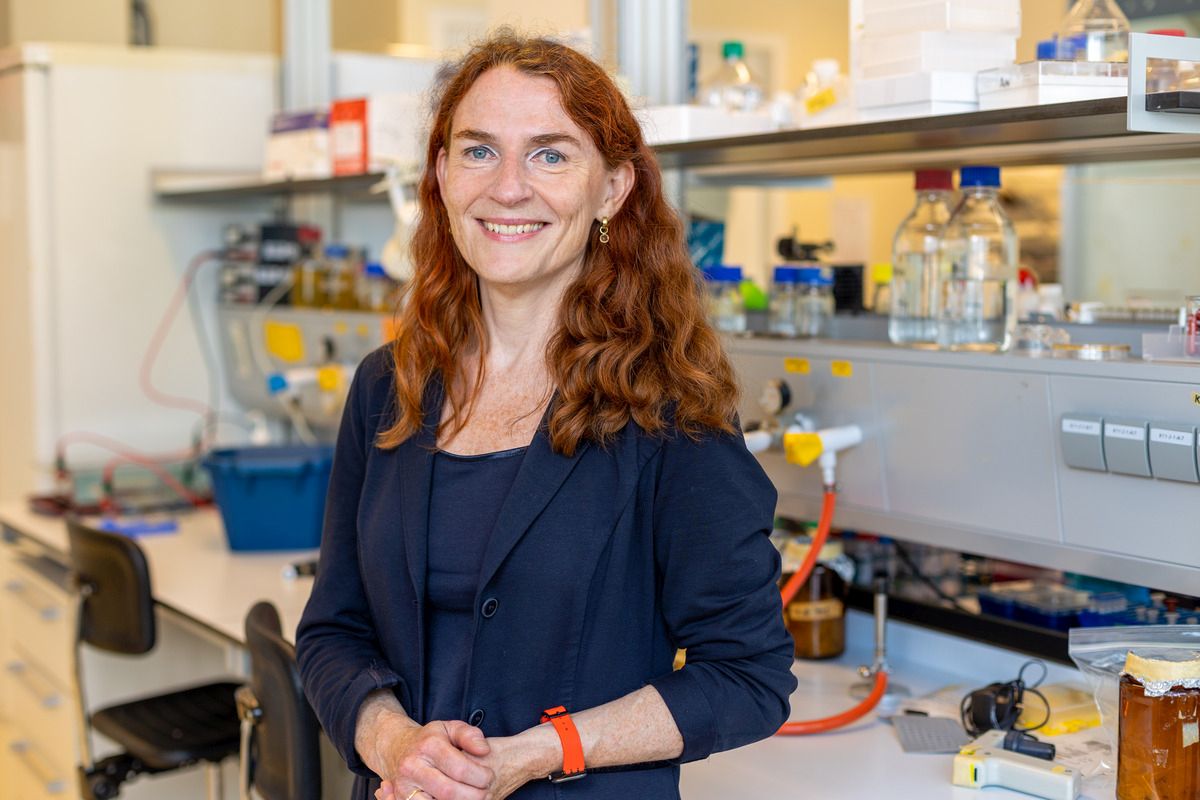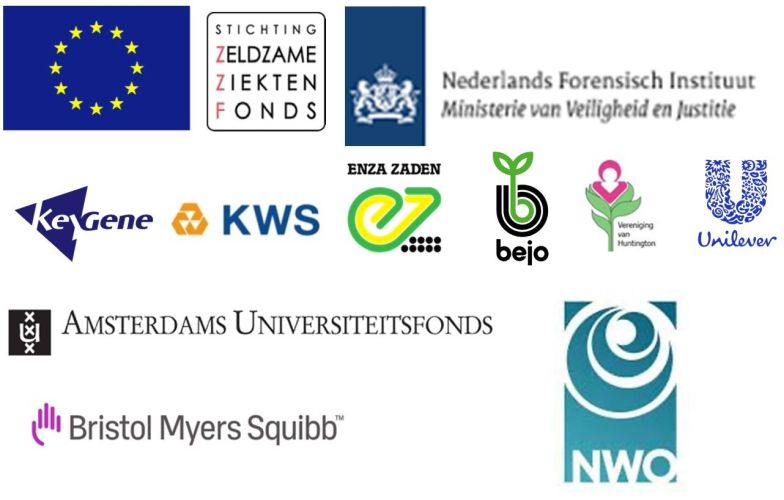All cells within one individual contain identical genetic material encoded by roughly 6.4 billion base pairs distributed across 46 chromosomes. From this one set of instructions, an extraordinary diversity of cell types and functions arises to shape and maintain the human body.
This cellular diversification is made possible by epigenetics, biological mechanisms that impact gene activity without changing the DNA sequence itself. (See text box Epigenetics).
Prof. Pernette Verschure studies how genes are dynamically activated and silenced through epigenetic regulation. Understanding these mechanisms can offer new insights for comprehending and treating diseases. She will deliver her inaugural address ‘De dynamiek van onze genen’ (‘The dynamics of our genes’) on Friday April 19 at 4.30 pm.
information into when a gene becomes responsive to epigenetic instructions.”
“Genes are not just ‘on’ or ‘off’, but each gene follows a specific rhythm, called transcription bursting,” Prof. Verschure explains. “This gene activation rhythm provides information into when a gene becomes responsive to epigenetic instructions. Essentially, the timing of gene activity switching may contribute to a mechanism by which a cell starts to differentiate from a neighboring cell, leading to a heterogeneous cell population. Understanding of such temporal regulation provides us insights into the functional dynamics of epigenetic regulation.”
Epigenetic reprogramming of specific genes offers unique opportunities for understanding disease development and finding new avenues for treatment. Prof. Verschure aims to use gene-specific dynamics to investigate the response to therapies in diseases where these processes are deregulated.
___________________________________________________________________________
Epigenetics
Epigenetic gene regulation plays a key role in establishing and maintaining gene expression patterns across diverse cell types within the body. However, there is significant variability in gene expression among identical cells within a population, such as those of a specific tissue type. Despite advances in whole genome mapping, understanding the dynamics and variability of epigenetic regulation at the individual cell level remains limited.
Epigenetics involve chemical modifications of DNA and histone proteins that govern the packaging state of chromatin, thereby modulating gene activity without altering the DNA sequence. Key epigenetic mechanisms include DNA methylation, histone modifications, nucleosome spacing, and the three-dimensional arrangement of the genome within the nucleus. These processes collectively influence the accessibility of the DNA code, dictating whether genes are turned on or off.
Epigenetic modifications are essential for healthy development and differentiation of cells. They also allow cells to respond dynamically to various internal and external signals. Lifestyle and environmental factors can influence an individual's gene expression profile through epigenetic mechanisms and, by extension, their health and disease risk, potentially across generations. Aberrant epigenetic regulation is associated with developmental abnormalities, neurological disorders, and cancer because of inappropriate activation or silencing of genes. The dynamic and reversible nature of epigenetic modifications offers potential avenues for novel therapeutic interventions.
_____________________________________________________________________________
Epigenetics: Beyond Disciplinary Boundaries
The epigenetic research performed by Prof. Verschure and her team crosses disciplinary boundaries - from studies on hormonal breast cancer, UV-induced DNA damage and repair regulation, to advancements in forensic science.
“We use interdisciplinary approaches to gain a unique combination of perspectives and expertise to address complex research questions,” says Prof. Verschure. “Our insights and methodologies are applicable in many research areas and provide valuable and actionable leads.”
The epigenetic research is being utilized in some surprising ways, such as the collaboration between the Dutch Forensic Institute and Prof. Verschure’s team. Based on the observation that various DNA methylation patterns are prone to change over the years, the team confirmed that the approximate age of an individual can be determined by epigenetic ‘fingerprints’ in DNA from blood, saliva, or human tissues.
Prof. Verschure’s chair at the Medical Faculty in the Department of Medical Biochemistry provides ample opportunities to apply her fundamental knowledge into clinical application. For this, she concentrates on time-dependent epigenetic regulation. Prof. Verschure: “We will investigate the critical point at which a stable system becomes disrupted. We are particularly interested in the interaction between cancer cells and neighboring cells, especially the role of immune cells.”
Building Collaborative Bridges
Prof. Verschure is very active in organizing and coordinating national and international scientific collaborations. “This is how academic research works best, in my opinion,” she says. “Synergy arises from bringing interdisciplinary (inter)national experts together to tackle a scientific challenge. Like in our European 'EpiPredict' innovative training network, we were investigating the causal role and predictive value of epigenetic alterations in breast cancer cells that develop resistance to hormonal therapy. This involved the training of 11 PhD students at 15 research institutes in 8 different European countries. It is really inspiring and rewarding, the sharing of knowledge to facilitate new discoveries that have the potential to make a difference for patients with breast cancer, while educating the next generation of scientists.”
Changing the Epigenetic Landscape
Utilizing the Nobel Prize-winning CRISPR technology, epigenetic signatures can be overwritten. However, long-term epigenetic reprogramming is still virtually unexplored territory, according to Prof. Verschure. She is investigating this with a NWO-funded Epi-Guide-Edit consortium.“
We aim to establish the rules and tools to predicting the conditions of sustained epigenetic reprogramming. These can then be applied to address societal challenges such as diseases like aging and the world food challenge. We are collaborating with academic partners, medical centers, industrial partners, as well as partners in social and applied sciences to responsibly develop long-term epigenetic editing as a key technology.”

Adjusting epigenetic changes by reprogramming specific genes offers unique opportunities to understand disrupted cell behavior and can help us tremendously in understanding and treating diseases." Pernette Verschure, Professor of Functional Dynamics of the Epigenome.
Biography Prof. Pernette Verschure
Prof. Dr. Pernette J. Verschure’s research into the dynamics of the epigenome bridges fundamental research at the Swammerdam Institute for Life Sciences with clinical applications at Amsterdam UMC. July 2021, she was named ‘Professor by special appointment of Functional Dynamics of the Epigenome’ at the Faculty of Medicine of the University of Amsterdam.
Prof. Verschure laid the foundation for a research career in cellular and molecular biology with a master’s degree in medical biology from the University of Amsterdam (UvA) and a PhD from the Department of Rheumatology at Radboud UMC. Her early career experiences include roles as a junior researcher at Smith Kline Beecham Pharmaceuticals in Philadelphia, USA, and as a visiting scientist at the Department of Cell and Structural Biology at the University of Illinois, USA. Her work was recognized through several prominent personal career fellowships and scholarships, including awards from the Dutch Research Council (NWO) (PULS, VIDI, Meervoud) and the Royal Netherlands Academy of Arts and Sciences (KNAW).
Prof. Verschure became group leader (PI) at the Swammerdam Institute for Life Sciences (UvA) in 2004 and associate professor in 2013. She is involved in many (inter)national research collaborations and coordinates the Co van Ledden Hulsebosch forensic research and expertise center at the Netherlands Forensic Institute.
Prof. Verschure initiated and coordinated the € 2.8 million 'EpiPredict' EU H2020 Marie Slodowska-Curie Innovative Training Network, focusing on epigenetic regulation of breast cancer progression. She served as working group chair in EU COST-Action International Nucleome (INC). In 2022, Prof. Verschure received a NWO Key Technologies grant in support of the interdisciplinary ‘Epi-Guide-Edit’ consortium to develop sustained epigenetic reprogramming. She is Associate Editor of the Springer Nature Epigenetics Communications scientific journal since 2020.
In addition to her research, Prof. Verschure is actively involved as lecturer and coordinator in various Bachelor courses at the Science Faculty (FNWI) of University of Amsterdam and she served as chair of the examination committee of the master’s in forensic sciences at FNWI. Between 2011 and 2017, she was chair of the executive board of the Women in the Faculty network at the Science Faculty of the University of Amsterdam. Presently, Prof. Verschure is a member of the curriculum committee in establishing a new interdisciplinary Bachelor program, Science, Technology and Innovation representing the ‘Engineering life and health’ theme.
For more information contact Prof. Pernette Verschure, and/or attend her inaugural lecture in person or online on Friday, April 19 at 4.30 pm.
Pernette Verschure’s research is facilitated by funding from:

Text by Henri van de Vrugt and Pernette Verschure. Photos by Kirsten van Santen (header image) and Liesbeth Dingemans.
This article was created for Cancer Center Amsterdam.
Follow Cancer Center Amsterdam on LinkedIn & X/ Twitter.
© 2024 New Haven Biosciences Consulting– All rights reserved.

